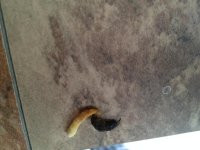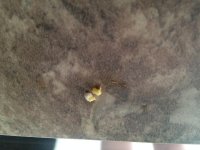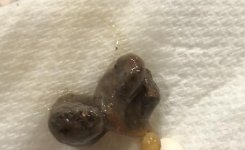I have hypothesized Edgars sudden development of yellow urates is from carrots being fed to the feeders vs sweet potato which I've always used and he's had white urates. I've switched the mealworms and dubia back on to sweet potatoes and I'll see what develops.
I am awaiting news of the color of Edgar's urates once the feeders get back to the sweet potatoes.
Did you notice my vitamin A caution in another thread? Sweet potatoes contain huge amounts of vitamin A. Here's what Dr. Ivan Alfonso says just a few years back:
Vitamin A in Chameleons: Friend or Foe?
Vitamin A in Chameleons: Friend or Foe?
by IVAN ALFONSO, DVM on JUNE 15, 2011
"Vitamin A has a long history in reptile medicine and unfortunately, most of that history isn’t good. It started mainly with turtles developing puffy eyes which was determined to be the result of Vitamin A deficiency. Supplementing with vitamin A became popular and almost every eye ailment in turtles and tortoises alike was attributed to Vitamin A deficiencies. Unfortunately it is a lot easier to overdose with vit A than underdose, and many turtles and tortoises (especially tortoises) developed severe issues due to the overdose. Since then, vitamin A became public enemy and many supplements switched to its precursor (beta- carotene) as the source for vitamin A. The reasoning being that you can’t overdose beta-carotene and reptiles, like mammals, would be able to manufacture Vitamin A from it. And so was the understanding for many, many years until reptile medicine advanced and research, true research, was done with vitamin A and its benefits.
Recently, and I say recently in relative terms, vitamin A has been discovered to play an important role in eye function, skin health and reproductive function in reptiles among other things. In chameleons, vitamin A plays an important role in keeping the overall health of the reptile and some species need it more than others. It has been my experience that species that are known to include vertebrate prey as part of their diet will need vitamin A in larger quantities than those who are strict insectivores. Panthers, Veileds, Mellers, Oustalets, Verrucosus and to some degree Parson’s all have shown some degree of vitamin A needs. Jackson’s, Mountain, Four-Horned, Giant Three-Horned and other montane species seem to benefit from vitamin A but at much lower levels.
So how much vitamin A is really needed? So far nobody knows for sure and that’s why it is better to not use too much and be safe. But, when used sporadically and responsibly, vitamin A is an invaluable ally in keeping chameleon health, especially in actively breeding females. I normally recommend using vitamin A in its palmitate form once every 14 days and only 1 little drop at that. On montane species, the dose can be every 21 days. For breeding females I like doing it every 10 days for lowland species and every 14 days for montane species. I use my own mix of vitamins that I make myself for my reptiles and have had great success, but any vitamin A palmitate should work just as good.
But what about the study that says vitamin A deficiencies are rare? There is such a study and it has been used as a rule in many places. However, the study failed to actually examine every lizard species. The study likely used Iguanas and maybe some carnivorous lizard such as Tegus or Monitors as the subjects.
Herbivorous lizards are capable of deriving their vitamin A from precursors found in high carotene items such as carrots, sweet potatoes and squash among others. Carnivorous lizards can get all the vitamin A they need by ingesting the flesh of their prey, being that vitamin A is a fat-soluble vitamin and found in the fat and tissues of vertebrates. So yes, it is very easy to overdose vitamin A in herbivores and carnivores, but what about insectivores? Where is the study on them? A small study was done many years ago where Panther chameleons would show a dramatic health improvement when provided with pre-formed vitamin A. Why would that be? Think about it…..chameleons and all insectivores depend solely on their insect prey to pass along all their nutrition. In captivity, our feeder insects never get the same nutrition they would in the wild therefore providing less than optimal vitamin levels to our chameleons.
Add to this an even more recent study where it has been proven that reptiles in general do not metabolize beta-carotene into vitamin A, they actually use different precursors for this. We immediately find ourselves depriving our chameleons entirely of vitamin A and then thinking that’s ok because too much vitamin A is bad. Extremes are bad, we need to aim for the balance, the middle of the road, and it is hard to do when you don’t know just how much to give.
My advice is to not neglect vitamin A in your chameleon’s diet regardless of the species. They need it but maybe in very small amounts. If you use vitamin supplements that contain the active form of vitamin A or pre-formed vitamin A, then use them sporadically as stated above. If you use the liquid form of vitamin A, be careful and use also very sporadically. Aim for very little exposure to the vitamin but some exposure none thle ess. I have managed to treat many chameleons, mainly panthers, with chronic health problems with a protocol of vitamin A dosing. Not every chameleon issue is due to vitamin A problems and with proper nutrition and supplementation, vitamin A issues should be rare, but don’t think that vitamin A isn’t necessary because you will be running into issues sooner or later."





